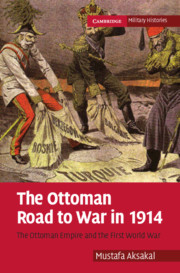Book contents
- Frontmatter
- Contents
- Acknowledgments
- Author's note
- Abbreviations
- Glossary
- Maps
- Introduction: pursuing sovereignty in the age of imperialism
- 1 The intellectual and emotional climate after the Balkan Wars
- 2 1914: war with Greece?
- 3 The Ottomans within the international order
- 4 The Great War as great opportunity: the Ottoman July Crisis
- 5 Tug of war: Penelope's game
- 6 Salvation through war?
- Conclusion: the decision for war remembered
- Bibliography
- Index
- References
Bibliography
Published online by Cambridge University Press: 02 July 2009
- Frontmatter
- Contents
- Acknowledgments
- Author's note
- Abbreviations
- Glossary
- Maps
- Introduction: pursuing sovereignty in the age of imperialism
- 1 The intellectual and emotional climate after the Balkan Wars
- 2 1914: war with Greece?
- 3 The Ottomans within the international order
- 4 The Great War as great opportunity: the Ottoman July Crisis
- 5 Tug of war: Penelope's game
- 6 Salvation through war?
- Conclusion: the decision for war remembered
- Bibliography
- Index
- References
- Type
- Chapter
- Information
- The Ottoman Road to War in 1914The Ottoman Empire and the First World War, pp. 195 - 207Publisher: Cambridge University PressPrint publication year: 2008



